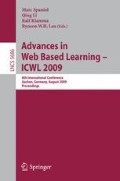Abstract
Personalisation has been seen as the answer to the vast quantity of information now available digitally. Information is tailored to meet each user’s apparent needs, whether making use of Web-based learning materials, purchasing from online sites, accessing entertainment products or any other potentially-personalisable facility. Yet before rushing headlong into personalising everything, including online learning systems, we need to consider the threats posed by the capture of so much data about individuals, the implications of personalised information delivery, and whether the benefits of personalisation justify the costs. In this paper, we look at both the issues and benefits of personalisation, and consider how to steer our way to a safe and valuable use of personalisation.
Access this chapter
Tax calculation will be finalised at checkout
Purchases are for personal use only
Preview
Unable to display preview. Download preview PDF.
References
Arrington, M.: AOL Proudly Releases Massive Amounts of Private Data, http://www.techcrunch.com/2006/08/06/aol-proudly-releases-massive-amounts-of-user-search-data/
Boyle, C., Encarnacion, A.O.: MetaDoc: an adaptive hypertext reading system. User Modeling and User-Adapted Interaction 4(1), 1–19 (1994)
Brown, E., Brailsford, T., Fisher, A., Moore, A., Ashman, H.L.: Reappraising cognitive styles in adaptive web applications. In: Proc. WWW 2006. ACM, New York (2006), http://doi.acm.org/10.1145/1135777.1135827
Brown, E., Fisher, A., Brailsford, T.: Real users, real results: examining the limitations of learning styles within AEH. In: Proc. Hypertext 2007, pp. 57–66. ACM, New York (2007), http://doi.acm.org/10.1145/1286240.1286261
Brusilovsky, P.: Adaptive Hypermedia: From Intelligent Tutoring Systems to Web-Based Education. In: Gauthier, G., VanLehn, K., Frasson, C. (eds.) ITS 2000. LNCS, vol. 1839, p. 1. Springer, Heidelberg (2000)
Brusilovsky, P.: Adaptive Hypermedia. User Modeling and User-Adapted Interaction 11, 87–110 (2001)
Brusilovsky, P.: Adaptive navigation support in educational hypermedia: the role of student knowledge level and the case for meta-adaptation. British Journal of Educational Technology 34(4), 487–497 (2003)
Brusilovsky, P., Millán, E.: User Models for Adaptive Hypermedia and Adaptive Educational Systems. In: Brusilovsky, P., Kobsa, A., Nejdl, W. (eds.) Adaptive Web 2007. LNCS, vol. 4321. Springer, Heidelberg (2007)
Brusilovsky, P., Sosnovsky, S., Yudelson, M.: Addictive links: The motivational value of adaptive link annotation. New Review of Hypermedia and Multimedia 15(1), 97–118 (2009)
DeBra, P., Aroyo, L., Chepegin, V.: The Next Big Thing: Adaptive Web-Based Systems. J. Digital Information 5(1) (2004), http://journals.tdl.org/jodi/article/view/124/122
Fishman, C.: Face time with Jeff Bezos. Fast Company (43) (2001)
Halstead, D., Ashman, H.: Electronic profiling - the privatisation of Big Brother. In: Proc. Ausweb 2000, Southern Cross University (2000), http://ausweb.scu.edu.au/aw2k/papers/halstead/index.html
Kaptelinin, V.: Item recognition in menu selection: the effect of practice. In: Conference on Human Factors in Computing Systems, INTERACT 1993 and CHI 1993 conf. companion on Human factors in computing systems, pp. 183–184 (1993), http://portal.acm.org/citation.cfm?id=260196
Kay, J.: Stereotypes, Student Models and Scrutability. In: Gauthier, G., VanLehn, K., Frasson, C. (eds.) ITS 2000. LNCS, vol. 1839, pp. 19–30. Springer, Heidelberg (2000)
Kelly, D.: Adaptive versus learner control in multiple intelligence learning environment. J. Educational Multimedia and Hypermedia 17(3), 307–336 (2008)
Kobsa, A.: Privacy-Enhanced Personalisation. Comms of the ACM 50(8), 24–33 (2007)
Laurillard, D.: Rethinking University Teaching: A Framework for the Effective Use of Learning Technologies, 2nd edn. RoutledgeFalmer (2002)
Mayes, T., DeFreitas, S.: Learning and e-learning: the role of theory. In: Beetham, H., Sharpe, R. (eds.) Rethinking Pedagogy for a Digital Age: Designing and delivering e-learning, pp. 13–25. Routledge, London (2007)
Nelson, T.: Geeks Bearing Gifts. Mindful Press (2009)
Nielson, J.: Personalisation is Over-Rated (1998), http://www.useit.com/alertbox/981004.html
Peters, M.: Guiding Principles for Providing “Remember Me” Personalisation, http://www.boxesandarrows.com/view/guiding_princip(@006
Sugiyama, K., Hatano, K., Yoshikawa, M.: Adaptive Web Search Based on User Profile Constructed without Any Effort from Users. In: Proc. WWW 2004, pp. 675–684 (2004)
Tapscott, D.: The Impending Demise of the University (2009), http://www.edge.org/documents/archive/edge288.html#tapscott
Walton, J.: The Evolving Web. BBC Magazine (2006), http://news.bbc.co.uk/1/hi/magazine/5030270.stm
Weber, G., Brusilovsky, P.: ELM-ART: An adaptive versatile system for Web-based instruction. Int. Journal of Artificial Intelligence in Education 12(4), 351–388 (2001)
Yates, G.C.R.: Applying Learning Styles Research in the Classroom: Some Cautions and the Way Ahead. In: Riding, R.J., Rayner, S.G. (eds.) International Perspectives on Individual Differences. Cognitive Styles. Ablex Pubs., Stamford (2000)
Zaslow, J.: If TiVo Thinks You Are Gay, Here’s How to Set It Straight. Wall Street Journal (2002)
Author information
Authors and Affiliations
Editor information
Editors and Affiliations
Rights and permissions
Copyright information
© 2009 Springer-Verlag Berlin Heidelberg
About this paper
Cite this paper
Ashman, H., Brailsford, T., Brusilovsky, P. (2009). Personal Services: Debating the Wisdom of Personalisation. In: Spaniol, M., Li, Q., Klamma, R., Lau, R.W.H. (eds) Advances in Web Based Learning – ICWL 2009. ICWL 2009. Lecture Notes in Computer Science, vol 5686. Springer, Berlin, Heidelberg. https://doi.org/10.1007/978-3-642-03426-8_1
Download citation
DOI: https://doi.org/10.1007/978-3-642-03426-8_1
Publisher Name: Springer, Berlin, Heidelberg
Print ISBN: 978-3-642-03425-1
Online ISBN: 978-3-642-03426-8
eBook Packages: Computer ScienceComputer Science (R0)

